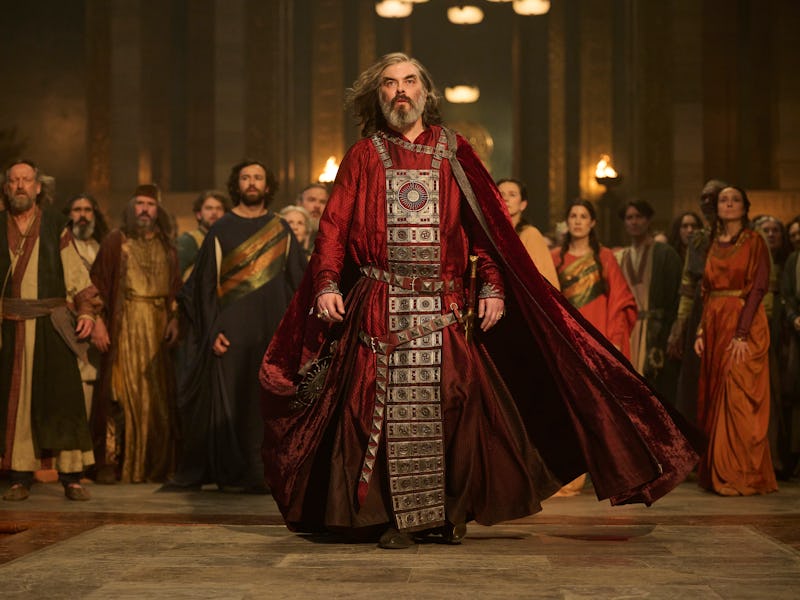“He Thinks the Ends Justify the Means.”
Rings of Power’s most hateful villains (outside of Sauron) chart the beginning of the end of Númenor.

The sea masters of Middle-earth might believe they could be the rulers of everything, but once King Pharazôn of Númenor starts down a dark path of betrayal and domination, his destiny as a puppet of Sauron is almost totally assured. As deep-cut Tolkien Lord of the Rings lore goes, the fall of Númenor occupies a sizable space in the imaginations of hardcore fans. But in Season 1 of The Rings of Power, some fans felt the depiction of this island kingdom was an instance of the show treading water and not really doing justice to the full potential of this massive and tragic story.
Now, the Númenor story has kicked into high gear, with Pharazôn (Trystan Gravelle) and his son, Kemen (Leon Wadham), steadily becoming the most hated villains of Season 2. And in Episode 5, the actions of both Pharazôn and Kemen finally reveal the importance of this piece of the Tolkien puzzle.
“There’s a lot going on with him,” Gravelle tells Inverse. “Not altogether bad, but obviously the results are devastating,”
Part of the reason why the Númenor stories are so compelling this time around is that the actors themselves are deeply steeped in the books, specifically The Fall of Númenor and the “Akallabeth” section of The Silmarillion. In fact, Gravelle and Wadham probably know more about Númenor than most serious Tolkien fans.
Just before the airing of Episode 5 of Season 2, Inverse caught up with Gravelle and Wadham to get their takes on the future of Númenor’s downfall, and how their characters might exist outside of established Middle-earth canon.
Spoilers for The Rings of Power ahead.
The coming fall of Númenor
Kemen and Pharazôn: two guys with more ambition than sense.
Amid new troubles for the Dwarves, Sauron’s latest schemes, and a surprising alliance, the biggest twist and turns this episode all happen in the suddenly unstable kingdom of Númenor. After a coronation gone sideways, Pharazôn makes it clear he resents the immortality of the Elves and tasks his son, Kemen, with dealing with the much nobler Elendil and his loyal son Valandil. By the end of the episode, the scheming Kemen stabs Valandil, even after Valandil spares the young prince’s life.
“In Season 1, Kemen learned that he can take risks and either they’ll pay off, or they won’t,” Wadham tells Inverse. “But, either way, he won’t be penalized for it.” This makes Kemen “dangerous” even though he considers himself to be a nice guy.
All this risky callousness will go on to define Númenor at some yet-to-be-depicted moment in the future, but from the point of view of King Pharazôn, it’s totally justified, for now.
“What’s nice is exploring where he’s coming from and how he can justify things that he does,” Gravelle says. “There’s a lot of disenchantment — why are we on this island? He’s a bit like Milton’s Paradise Lost. He feels like the Elves have treated the Númenóreans like second-class citizens. It’s like someone saying, ‘Go to the Garden of Eden, but don’t eat the apple.’ Pharazôn’s not that guy. With him, he thinks the ends justify the means.”
Númenor Canon, Beyond Tolkien
Leon Wadham has thought about Númenor probably more than he can even admit.
Talking to Wadham and Gravelle reveals one clear detail: You’d want to be in a book club with either of these guys. Both make casual references to events in The Silmarillion and The Fall of Númenor the way normal people talk about the weather. Clearly, they’ve consumed not just the primary texts the show draws upon — The Lord of the Rings and the appendices in Return of the King — but all the supplementary material, too.
“I was very aware our take was different than what you might expect because you read in the books that Pharazôn is a big powerful man and everything,” Gravelle says. “But that doesn’t mean he’s got a six-pack. He wouldn’t have been a bodybuilder. He’d be a sea captain, so he’d be a different physique. When we see Pharazôn in the first [season], he looks like he’s past his prime. But in the second season, it’s like, oh he’s sort of regaining something. It’s almost as if he’s getting younger.”
Trystan Gravelle at the world premiere for The Lord of the Rings: The Rings of Power Season 2.
In existing lore, Pharazôn will meet a bad end after bringing Sauron into the kingdom of Númenor, though some fans wonder if Rings of Power will alter the canon and make Pharazôn into one of the Ringwraiths. This theory would certainly track with the way the character is going at this point, and Gravelle talking about how Pharazôn craves immortality only seems to make his possible fate as a Ringwraith even more likely.
In fact, even if we don’t get the complete fall of Númenor this season, there’s certainly reason to believe that the fates of many of the characters in this kingdom — from Pharazôn to Elendil — could end up slightly different than we thought. In fact, the exile and story of Queen Regent Míriel (Cynthia Addai-Robinson) is already different than what we’d come to believe.
Could this mean certain nonbook characters, like the duplicitous and scheming Kemen, actually survive beyond the fall of Númenor? Does Kemen have more agency than other characters because he exists outside of the books?
“It’s fun that it's up in the air. It could go either way,” Wadham says. “At certain times, I feel like he could swap allegiances or that at other times, he feels doomed.”